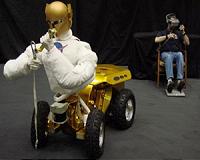 |
Genoa, Italy (UPI) Mar 17, 2009 Italian scientists say they have developed a robot that could become a teacher to help paralyzed stroke patients learn to use their arms again. Researcher Elena Vergaro at the University of Genoa worked with scientists at the Italian Institute of Technology to develop the robotic arm for a pilot trial involving 10 patients. The researcher's robot assists patients as they attempt to guide its "hand" in a figure-of-eight motion above a desk, with the robot pulling in the correct direction and resisting incorrect movements to a minutely controlled degree. The scientists said the interactive assistance allows for alternating levels of help. "Our preliminary results from this small group of patients suggest that the scheme is robust and promotes a statistically significant improvement in performance," Vergaro said. "Future large-scale controlled clinical trials should confirm that robot-assisted physiotherapy can allow functional achievements in activities of daily life." She said the robot, by demonstrating correct arm movements, can help a patient's motor system learn to replicate the desired trajectory by experience. The study is reported in the Journal of NeuroEngineering and Rehabilitation.
Share This Article With Planet Earth
Related Links All about the robots on Earth and beyond!
 Avatars In Space
Avatars In SpaceMoffett Field CA (SPX) Mar 16, 2010 This year, much of the buzz surrounding the 82nd Annual Academy Awards was focused on the technological achievements of James Cameron's Avatar. In this tale of habitable, extrasolar moons and extraterrestrial mining operations, Cameron brought the concept of 'tele-exploration' to the general public. For those who haven't seen the world box-office-record-holding film, it is the tale of a wo ... read more |
|
| The content herein, unless otherwise known to be public domain, are Copyright 1995-2010 - SpaceDaily. AFP and UPI Wire Stories are copyright Agence France-Presse and United Press International. ESA Portal Reports are copyright European Space Agency. All NASA sourced material is public domain. Additional copyrights may apply in whole or part to other bona fide parties. Advertising does not imply endorsement,agreement or approval of any opinions, statements or information provided by SpaceDaily on any Web page published or hosted by SpaceDaily. Privacy Statement |